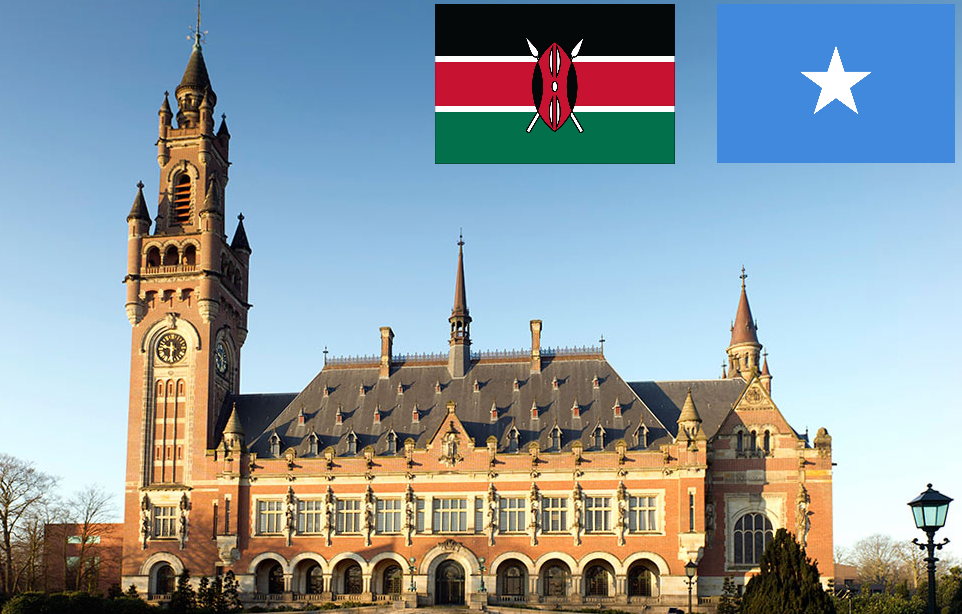
The International Court of Justice (ICJ) is expected to deliver a ruling on the Kenya-Somalia maritime dispute today and the entire Somali nation will be listening to the ruling that many anticipate to be in Somalia’s favor. But is the reliance on the ICJ’s decision sufficient to deter Kenya from infringing on Somali territory?
For the last 30 years, Somalia has attracted so many foreign interests in its soil, sea and other strategic influences and since 2006 the country is de facto occupied by foreign troops for dubious reasons.
It is in this condition that European oil companies pushed Kenya, in their eyes a stable country with which they can conclude lasting agreements, to claim the resource-rich southern Somali sea. In 2009, Norway’s ambassador in Kenya drafted the Memorandum of Understanding which sparked the current legal case.
Somalia’s recourse to the ICJ
With its sea now claimed by Kenya and Somalia’s grievance against its hegemonic neighbor to the south being decided at the ICJ, the country is counting on the impartial judgment of the Court to delimit the maritime borders of the two countries.
While Somalia is recovering from two decades of civil war and chaos and under UN Arms Embargo, it had no other recourse but to take its case to the ICJ to review and dismantle Kenya’s claim to its southern sea on the basis of international law.
Kenya, sure of its position of strength in the face of a divided Somalia, has always rejected the involvement of the International Court in this case and has even recently announced that it will not accept any decision which dismisses its claim. Kenya, which already occupies part of Somali territory, is even preparing its naval forces to impose its authority over the Somali Sea.
What if
Somalia at this stage is too reliant on the ICJ and is considering a decision in its favor. However, as previously discussed by Thomas R. Hensley, in his study titled National Bias and the International Court of Justice, ICJ justices’ decisions are influenced by their respective countries foreign policies. The scholar had clearly demonstrated that judges at the ICJ, because of national bias, have a “definite tendency to support their countries”.
According to the author, “the primary elements of the influence of national bias consist of considerations, implicit or explicit, of national interest and of culturally inculcated values. The most commonly considered component is national interest, stemming from the political, economic, or psychological importance which a decision has for a justice’s country.”
Knowing that many countries, whose judges currently sit on the ICJ, are directly or indirectly involved in Somalia or support Kenya’s illegal claim, namely Western countries, Somalia’s full confidence in Lady Justice’s impartiality is risky and only demonstrates its inability to defend its territory.
Whatever the decision of October 12, it is absolutely vital for Somalia to have a strong national army, and especially a navy to protect its long maritime coast. A necessary condition not only to force Kenya to respect its territorial integrity but also to deter potential invaders.
What next
Whether today’s decision is clearly in favor of Somalia or ambiguous, it will not prevent the very corrupt Uhuru Kenyatta, the Kenyan president, whose family owns stakes in offshore blocks illegally sold to foreign oil companies, to beat the drum of war to extend his expiring term or to extort a settlement from a more accommodating Somali administration.
At this point, since Kenya has declared that it will not be bound by any ICJ decision, Somalia should explore other diplomatic avenues to oppose Mr. Kenyatta’s aggressive posture while bolstering its security forces. However, Kenyan intimidation should be resisted as long as the UN arms embargo is in place and Kenyan forces are embedded in African Mission in Somalia (AMISOM).
In short, Somali leaders should find a way out of this election stalemate and elect a strong-willed president who can resist competing foreign interest in Somalia and put a full stop to this senseless dependence on external factor. With regard to our already historically reduced territory, Somalis should bluntly reject any pressure to bilateral talks, mediation, in the form of international forum deliberation or arbitrary partition.

let me tell you 2 things. first I have to agree Uhuru is beating a drum of War to get term extension. 2nd, Kenya is our neighbor based on ICJ Oct 12 2021, Kenya has no choice but to sit with somalia. Naval or strong army wouldn’t stop Somalis to defend their country. Kenyans are Brit boys. their big man will not allow them to throw stones to a very dangerous neighbor. live with it.